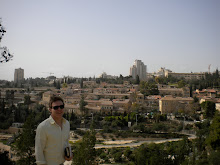
If we ever thought that crossing the border was tricky in North America, it was only because we had not experienced the chaos that exists elsewhere. Presently, Israel and Jordan are at 'peace'; but all that really means is that there are no wars at present. The people on the eastern side of the Jordan River are not too fond of those on the western, and likewise are the Israelis.
Nevertheless, we managed to cross the border in only a few hours, mostly due to the fact that we are all white, American tourists. And even though we had officially left the Promised Land (depending on how much one reads into the term...), we still had plenty of Bible-story-land in front of us. You see, the Israelites were given their land by their true God, YHWH, and the prophet Joshua was the one who divided it up for them. So, even though 2 of the tribes of Israel decided to stay in the Transjordan, those of Israel were well aware of their God-given boundaries. Their inheritance, however, was never enough for them.
All throughout the book of 1 & 2 Kings, the kings of Israel and Judah are constantly pushing and shoving their way across the Jordan and into the east. Their greed is not what is shocking, at least not compared to their concept of the land in the first place--they are under the impression that the land belongs to them. It is not as if they are just striving to get a little extra, but they do not even see their own greed, running as if they have the right to it; as if they deserve it.
As easy as it is to see the faults of ancient monarchs, the lesson that God showed them was not just for them, but extends to our lives as well. For the Lord ha
 s given each of us a portion, and if you have the capability to read this blog, then hopefully you can admit that it is an extravagant portion relative to the rest of the world. But just like the kings of Israel, somehow we can never be content with our own portion, and we are filled with the feeling that they each knew so well. We want more, and when we see others who have, we feel like we deserve it! I know I have already written on satisfaction in the Lord, but here I am referring more to being content with His blessings. For we know that He has given us all we have, and He has taken all that we have lost. But our hearts must look to those like Job, who remained faithful to God even though he lost everything. Can we be content like that? I'm not talking about being numb to our circumstances, or absent in the world, but can we love the Lord and appreciate His blessings enough to be grateful for our blessings, however plentiful or lacking they may be!?
s given each of us a portion, and if you have the capability to read this blog, then hopefully you can admit that it is an extravagant portion relative to the rest of the world. But just like the kings of Israel, somehow we can never be content with our own portion, and we are filled with the feeling that they each knew so well. We want more, and when we see others who have, we feel like we deserve it! I know I have already written on satisfaction in the Lord, but here I am referring more to being content with His blessings. For we know that He has given us all we have, and He has taken all that we have lost. But our hearts must look to those like Job, who remained faithful to God even though he lost everything. Can we be content like that? I'm not talking about being numb to our circumstances, or absent in the world, but can we love the Lord and appreciate His blessings enough to be grateful for our blessings, however plentiful or lacking they may be!?Let us rejoice in the blessings of the Lord, for "the LORD has given and the LORD has taken away; blessed be the name of the LORD" --Job 1:21
















